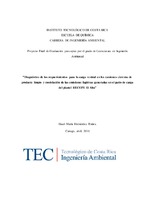Diagnóstico de los requerimientos para la carga ventral en los camiones cisterna de producto limpio y modelación de las emisiones fugitivas generadas en el patio de carga del plantel RECOPE El Alto
Resumen
Nowadays Volatile Organic Compounds (VOC’s) generated in the load of tank trucks in the Refinería Costarricense de Petróleo (RECOPE) are released into the atmosphere without pretreatment causing concerns about the harmful effects that this practice entails. To reduce environmental pollution, it’s propose to modify the loaders to perform the bottom loading and later install a recovery system of this vapors. The tank trucks are a key part of this gear and they must have an adequate equipment to allow them to perform the bottom loading and redirect the hydrocarbon vapors to the recovery system. There was an assessment in the status of the requirements the units actually have with the help of an evaluation instrument duly validated by the stakeholders. Furthermore complementarily, a modeling was performed with the program AERMOD View using meteorological data from the Ochomogo station to determine how these pollutants are dispersed and if there are potential impacts on surrounding populations. There was an evaluation of a total of 113 units, of which only 6.19% are suitable for bottom loading with vapor recovery, 38.05 % are suitable for modifications, while a 55.75 % are classified as unfit, also it is determined that the average age of the fleet is 27 years. On the other hand, dispersion lines show that the area affected by the dispersion of the vapors can be extended to the community of Taras in the rainy season and to “Barrio El Fierro” during dry season, being the area of greatest concentration nearby the campus. The community El Alto de Ochomogo is among the isoconcentration lines of 2500 to 5000 μg/m3, therefore respiratory diseases of this population are analyzed, which are recorded mostly during the rainy season, however, no correlation is found between records and the dispersion of VOC’s.
Descripción
Proyecto de Graduación (Licenciatura en Ingeniería Ambiental) Instituto Tecnológico de Costa Rica, Escuela de Química, 2016.


